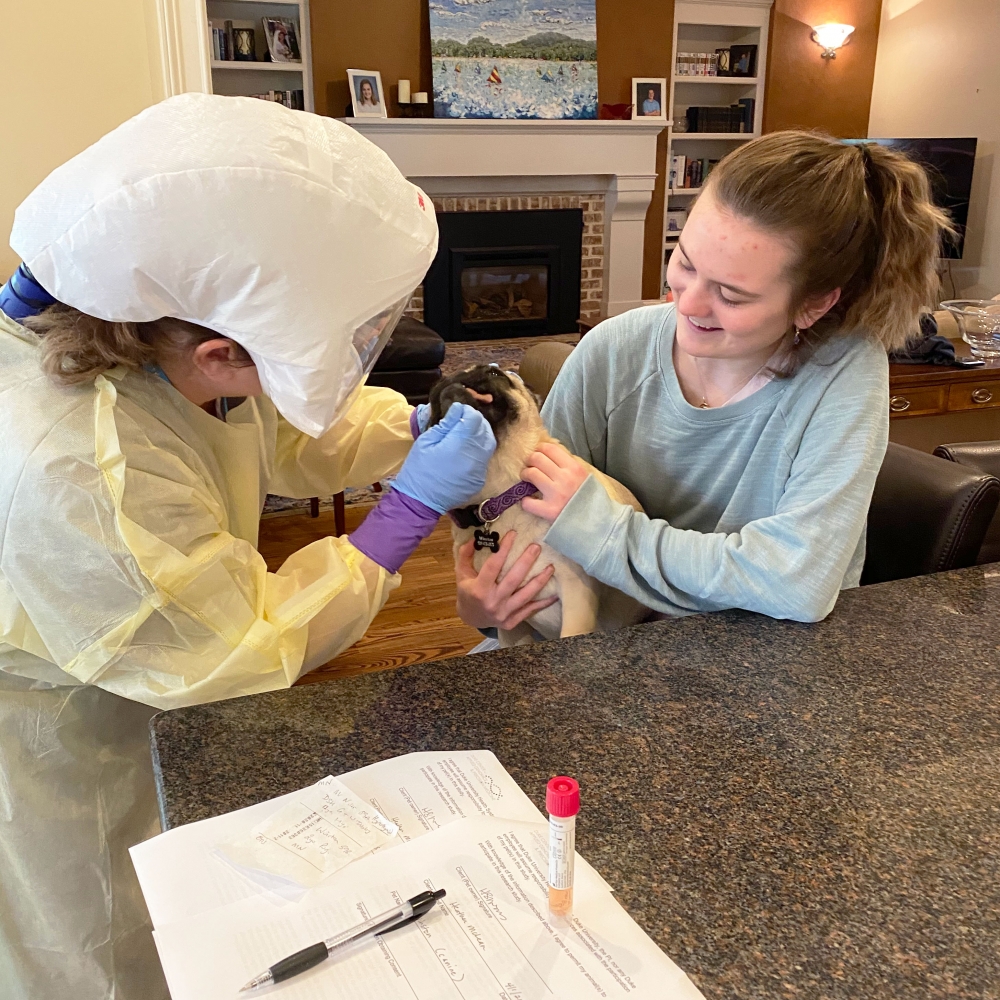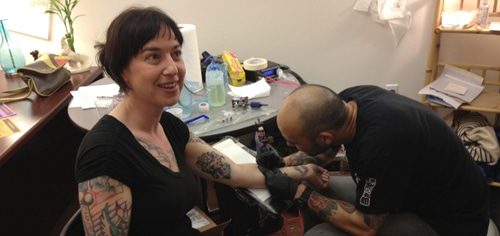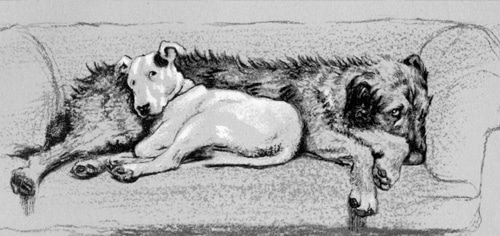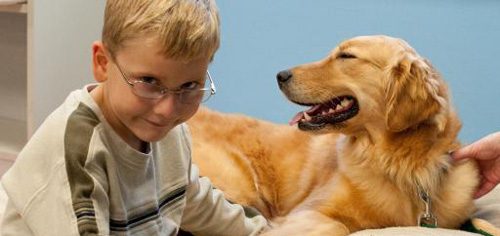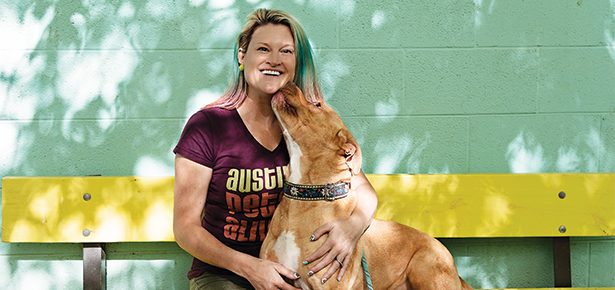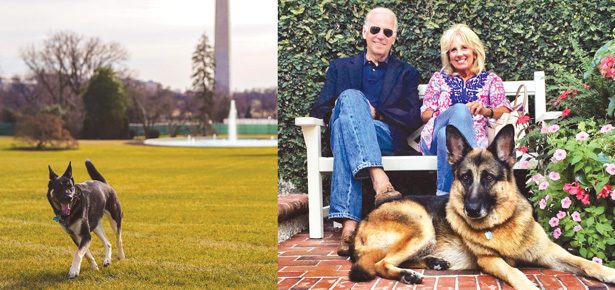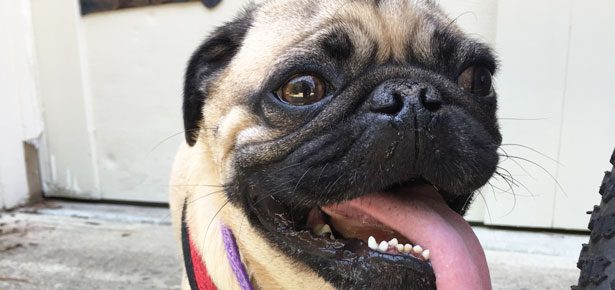
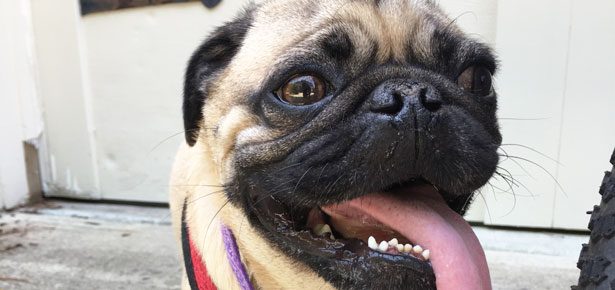
Pug Tests Positive for COVID-19
Winston the Pug’s mom talks to Modern Dog about the positive result and COVID-19 testing
Winston, a two-and-a-half-year-old Pug who lives with his family in North Carolina, tested positive for COVID-19 the last week of April. Winston is believed to be the first dog to test positive for COVID-19 in the United States. His family became sick with COVID-19 in March and then began participating in the Duke University study about the virus to help researchers develop vaccines and treatments for the virus. The family’s participation in the study is what led to their dog Winston being tested.
Winston’s mom, Dr. Heather McLean, a pediatrician at Duke, explained, “Our family (four people, two dogs, one cat) enrolled in a research study at Duke University (PI: Dr. Chris Woods’ MESSI study) on April 1st. On that day they did oral swabs of the dogs and cat. Friday, April 24th, a member of the research team told us that Winston’s saliva sample was positive for the novel coronavirus. They have been gathering samples (blood, nasopharyngeal swabs) from the people each week since enrollment but only collected the oral swabs from the animals the first day.”
It was a surprise to the family that Winston had tested positive for COVID-19. Although the McLean family was ill, Winston mostly seemed fine. “In the middle of March, when the humans were sick, my husband noticed that Winston had a mild cough for about two days and one morning he didn’t want to eat his breakfast. We don’t know for sure if these symptoms are related to the positive oral sample. We do know that the people were sick before Winston showed these symptoms,” Dr. McLean says. Winston was only mildly sick, recovered quickly, never needed vet care, and quickly bounced back to full health.
Winston the Pug getting swabbed
Winston isn’t the only pet in the house, though he is their only pet that tested positive for the virus. Dr. McLean noted that, “Our other two animals, Otis the 13-year-old Pug, and Mr. Nibs. the 12-year-old cat) had negative coronavirus saliva results. We haven’t noticed any symptoms in either of them.” The CDC’s most recent guidelines for pets and COVID-19 recommend that guardians restrict their pets from interacting with other people and animals outside and socially distance the same way that we are maintaining at least six feet of distance. The CDC also recommends that if someone is known to be sick with COVID-19 that they avoid contact with their pets as much as possible, ideally having someone else in the home caring for them. If someone with COVID-19 must care for their own pets, the CDC advises that they wash their hands before interacting and wear a mask. Unfortunately, because of the widespread lack of testing, people may not know if they are sick, many others are asymptomatic this isn’t always possible. “We were symptomatic before we knew we had COVID-19 so we couldn’t distance ourselves from our pets. He provided so much comfort to our family when we were scared and sick—I don’t know what I would have done without my buddy at my side” described Dr. McLean.
Dog guardians are understandably concerned to learn a dog has tested positive in the United States. (Previously two dogs in Hong Kong tested positive for COVID-19 and were quarantined, one who later was cleared to return home died days later. His guardian refused an autopsy, but the dog was 17 years old so likely age and the stress of quarantine played a part in his death.) The CDC’s guidelines say "there is no evidence that animals play a significant role in spreading the virus that causes COVID-19.” It’s easy for dog moms and dads to get scared hearing about Winston’s positive test result but it’s important to stay focused on the facts.
“I certainly I understand how pet owners are very concerned about what this positive result means for them. I would caution people who want to generalize our story because we really need to apply knowledge from science to help guide the recommendations,” cautioned Dr. McLean. The last thing anyone wants to see is more dogs surrendered out of unsubstantiated fear.
Winston along with his family continue to be part Duke’s study into COVID-19. “The research team is seeking to understand what Winston’s positive coronavirus sample means. I understand that they would like to collect another saliva sample, a rectal swab, and blood from Winston when the research team comes back to our house tomorrow. We are all interested to learn more about what this positive result means!”
Hopefully this study will help researchers to understand more about the virus and protect people and dogs worldwide. For his part, Winston has fully recovered.
“Winston is doing great—healthy with lots of playful energy and has a great appetite,” described Dr. McLean. At this point there are many unknowns about COVID-19 but what isn’t uncertain is how loved Winston is by his family, who after recovering from COVID-19 are all doing well.
…………………………………………………………………………………………………………………
Sassafras Lowrey is a Certified Trick Dog Instructor and author of “Tricks In The City,” “Healing/Heeling,” “Bedtime Stories For Rescue Dogs,” and the activity book “Chew This Journal” forthcoming in Summer 2020. Follow Sassafras and her canine adventures on Twitter/Instagram and at SassafrasLowrey.com
Join the newsletter and never miss out on dog content again!
"*" indicates required fields
By clicking the arrow, you agree to our web Terms of Use and Privacy & Cookie Policy. Easy unsubscribe links are provided in every email.
